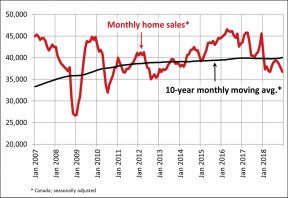It may have been tough to imagine even just 12 months ago, but Canada’s housing market is stagnating — and don’t expect a return to previous highs any time soon.
So suggests BMO Chief Economist Douglas Porter in a response to the newest statistics from the Canadian Real Estate Association (CREA), published today.
“It’s probably not a stretch to think that the Canadian housing market has entered into a prolonged period of relative stagnation, where sales are roughly flat and prices no longer outrun inflation,” writes Porter.
Porter notes that sales activity declined 11.1 percent in 2018, while the average price of a home dropped 4.1 percent, representing the largest downturn since 1995. It’s also the first time prices have fallen since 2008, when the market was roiled by the Great Recession.
According to CREA, the average price of a Canadian home was $472,000 in December, off by 4.9 percent from the same time a year ago.
“What a difference a year makes,” says Barb Sakkau, CREA’s president, in a statement.

Both Sakkau and BMO’s Porter note that December 2017 home sales were higher than usual as some homebuyers rushed to purchase property before new mortgage stress test rules were implemented.
“Since then, the stress-test has weighed on sales to varying degrees in all Canadian housing markets and it will continue to do so this year,” Sakkau predicts.
However, Porter suggests that fundamentals, including a stronger labour market, will lift home prices in Canada’s biggest market despite stress testing. “Realistically, prices should keep pace with inflation (or a bit better) as the cycle runs its course,” he writes.
That was certainly the case in December. The benchmark price of a Greater Toronto home was $764,200, an increase of about 3 percent on a year-over-year basis.
As with Toronto, Porter anticipates “stability” in Vancouver as a result of fundamentals. While Vancouver’s benchmark home price remains above the $1-million mark, it has declined about 2.7 percent from a year ago.
“Clearly this market has had even more to swallow (provincial measures in addition to federal moves) than most, and some of those headwinds should ease this year,” says Porter.
Not only did BC expand the Metro Vancouver foreign-buyer tax to the area’s environs, it increased it to 20 percent, up from 15 percent.
The province also announced a speculation tax, which follows the introduction of the City of Vancouver’s empty-home tax, which was implemented in 2016 and has raised tens of millions of dollars for the municipality.
While homebuyers in the Prairies don’t face the same hurdles, the region’s biggest housing markets have been struggling as the energy sector, a major employer, has been hit with lower oil prices.
“The Prairies—we’ll lump Calgary, Edmonton and Regina into this group—are in full-fledged stagnation mode already, to varying degrees,” Porter comments.
Benchmark prices were down annually in all three markets as of December.
“In fact, these boom-bust markets are undergoing more of a slow and agonizing melt at the moment, and there’s little reason to believe conditions will dramatically change this year,” Porter adds.
Canadian Home Prices Post Biggest Decline Since 1995. So What’s Next? by Josh Sherman | Livabl


Recent Comments